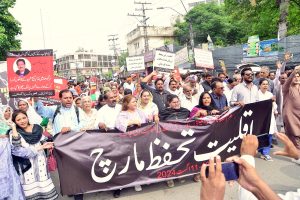Despite concerted efforts by the Pakistani government and Islamist groups to suppress protest rallies and marches, Christians across several cities mobilized in significant numbers on August 11 to commemorate National Minorities Day. They called for an end to religious intolerance and the misuse of blasphemy laws.
In 2009, the Pakistani government designated August 11 as a day to honor the contributions and dedication of religious minorities to the nation’s progress. This date also commemorates the historic speech by Pakistan’s founder, Muhammad Ali Jinnah, delivered on August 11, 1947, which pledged to safeguard the rights of minorities, including Christians, Hindus, and Sikhs.
This year, however, Christian marches encountered intense opposition from Islamist groups such as Tehreek-e-Labbaik Pakistan (TLP), Sunni Tehreek, and Jamiat Ulema-e-Islam-Fazl (JUI-F). These groups claimed that the Christian-organized rallies were part of a “foreign conspiracy” aimed at abolishing the blasphemy laws.
In Lahore, the capital of Punjab Province, police thwarted a planned 24-hour hunger strike camp organized by the Rawadari Tehreek (Movement for Equality) outside the Punjab Assembly. The camp was intended to protest against violent mob attacks on Christians accused of blasphemy.
“We had planned to start the hunger strike camp on August 10 and culminate it with a rally on August 11, but on Saturday evening, a large police contingent blocked the National Council of Churches in Pakistan (NCCP) premises where we had congregated and refused to let us out,” Rawadari Tehreek’s Chairman Samson Salamat said.
Salamat reported that senior police and security officials compelled them to postpone the hunger strike and granted conditional permission to hold a rally in front of the Lahore Press Club on Sunday, August 11, instead of the initially planned venue at the Punjab Assembly.
“The police also assaulted some of our members and detained two senior leaders at a police station for over eight hours,” he said. “They cited threats from the TLP and other extremist groups as reasons for the restrictions, but we argued that instead of yielding to these groups, they should uphold the rule of law and ensure our protection.”
The TLP, known for inciting anger over blasphemy issues, has been in the spotlight for its controversial and radical statements and actions. The party was established after the execution of Mumtaz Qadri, a police guard who assassinated the governor of Punjab, Salmaan Taseer, in 2011 for supporting Aasia Bibi, Pakistan’s most high-profile blasphemy accused.
On August 6, the TLP issued letters to district governments in major cities like Karachi and Sukkur in Sindh Province, and Lahore, Faisalabad, and Rawalpindi in Punjab Province, as well as the federal capital, Islamabad. The letters warned of unrest if permissions granted to Christians for holding marches were not immediately revoked.
“We warn the government to cancel the permissions granted to minority marches, as it is an attempt to malign the blasphemy laws, which will not be tolerated at any cost. Minorities are enjoying their constitutional rights in Pakistan and are free to practice their respective faiths, but no one will be allowed to disrespect our Prophet Muhammad,” stated the TLP letters addressed to the district administrations in Karachi and Islamabad.
Following the threats, the district governments in Karachi and Islamabad formally announced the revocation of permissions granted to Christian groups for their rallies. However, the Karachi administration reversed its decision after Christian activists held meetings with senior government leaders and staged protests.
“We were denied our constitutional right to speak for persecuted minorities,” said Salamat, adding that Lahore police also threatened to file cases against them. Despite the police’s heavy-handedness and threats from extremist groups, around 1,000 Rawadari activists still managed to hold a rally outside the press club.
“We demanded an end to the misuse of the draconian blasphemy laws and violence against minorities, particularly Christians in Punjab,” Salamat said. “We also protested against the suppression of our voices, which is a violation of our constitutional rights.”
In Karachi, several hundred Christians and members from other minority communities gathered outside Frere Hall. Dozens of TLP activists set up a camp about 500 meters from the venue but did not attempt to disrupt the minorities’ gathering, as a large police contingent had been deployed there.
“The event is a significant blow to Tehreek-e-Labbaik Pakistan and the government,” said Luke Victor, one of the march organizers. “Police erected barriers to prevent many participants from attending, and officials instructed us not to speak about the blasphemy law.”
Blasphemy, punishable by death in Pakistan, is a sensitive subject in the conservative Muslim-majority country, where mere accusations have led to street lynchings. Human rights groups argue that Pakistan’s harsh blasphemy laws are often misused to settle personal scores.
